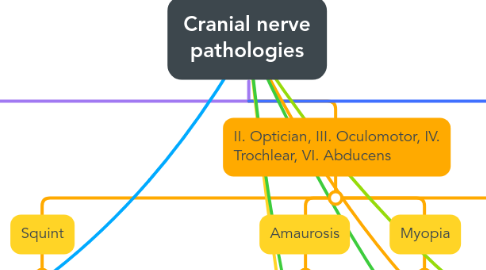
1. References: Gata Maya, D., Domingo Santos, A., Méndez Guerrero, A., & Bermejo Pareja, F. (2015). Pathology of the cranial nerves. Cranial nerve diseases. Medicine - Accredited Continuing Medical Education Program, 11, 4547-4554. Retrieved in July 2024 from: https://www.sciencedirect.com/science/article/abs/pii/S0304541215000657 Pérez Pola Eduar Antonio
2. I. Olfactory
2.1. Allergic rhinitis
2.1.1. Reaction to dust or pollen particles
2.2. Anosmia
2.2.1. Loss of sense of smell
2.3. Hyposmia
2.3.1. Reduced sense of smell
3. II. Optician, III. Oculomotor, IV. Trochlear, VI. Abducens
3.1. Squint
3.1.1. Divergent
3.1.1.1. Divergence of the lines
3.1.2. Convergent
3.1.2.1. The two eyes do not align
3.2. Amaurosis
3.2.1. Organ injury
3.2.1.1. Sight loss
3.3. Myopia
3.3.1. Blurry vision
3.4. Astigmatism
3.4.1. Irregular curvature of the cornea
3.4.1.1. Warped images
4. V. Trigeminal
4.1. Trigeminal neuralgia
4.1.1. Essential
4.1.1.1. Sharp and intense pain
4.1.1.1.1. More frequent in women
4.1.2. Symptomatic
4.1.2.1. Multiple sclerosis
4.1.2.1.1. 3%
4.1.2.2. Viral infections
4.1.2.2.1. Pain
4.1.2.2.2. Hyperesthesia
5. IX. Glossopharyngeal
5.1. Glossopharyngeal neuralgia
5.1.1. Paroxysmal pain
5.1.1.1. People over 60 years
6. X. Vague
6.1. Colitis
6.1.1. Ulcerative
6.1.2. Toxic
6.1.3. Associated with the use of medications
6.1.4. Hemorrhagic
6.1.5. Nervous
6.1.6. Granulomatous
6.2. Gastritis
6.2.1. Inflammation of the gastric mucosa
7. XI. Accessory
7.1. Dropped shoulder
7.1.1. Unilateral paralysis
8. XII. Halibut
8.1. Disartria
8.1.1. Bulbar
8.1.2. Pseudobulbar
9. VIII. Vestibulocochlear
9.1. Hearing loss
9.1.1. Of transmission
9.1.1.1. Affect bass tones
9.1.2. Neurosensory
9.1.2.1. They affect high tones
9.2. Benign positional vertigo
9.2.1. Episodes of vertigo
9.2.2. Paroxysmal nystagmus
9.3. Meniere's syndrome
9.3.1. Intense vertigo
9.3.1.1. Nausea, vomiting, nystagmus
10. VII. FACIAL
10.1. Facial paralysis
10.1.1. Peripheral
10.1.1.1. Facial nucleus injury
10.1.1.1.1. Ipsilateral injuries
10.1.2. Central
10.1.2.1. Paralysis of the muscles
10.1.2.1.1. lower
10.1.2.1.2. Contralateral
10.2. Hemifacial spasm
10.2.1. Paroxysmal contraction
10.2.1.1. Involuntary
10.2.1.2. Unilateral
10.3. Progressive facial hemiatrophy
10.3.1. Onset in adolescence
10.3.1.1. Slow progression
10.3.1.1.1. Progressive hemifacial thinning
